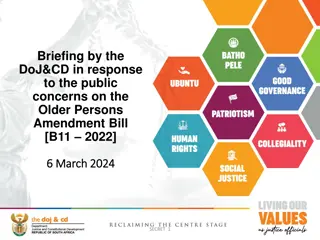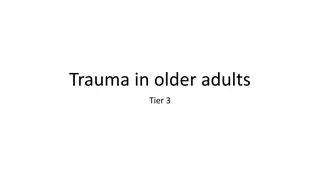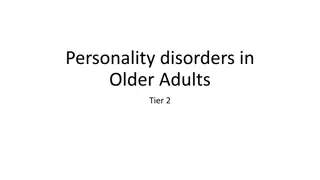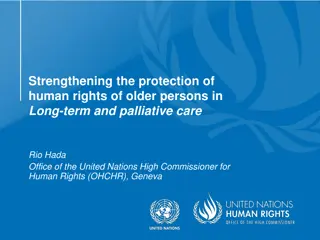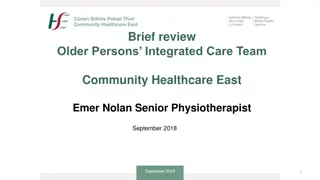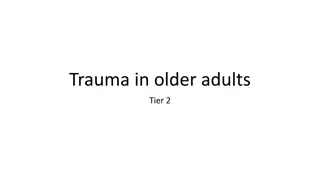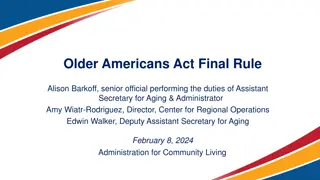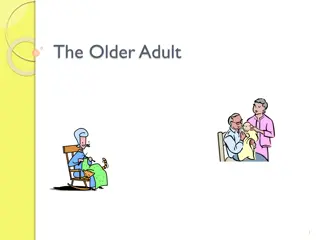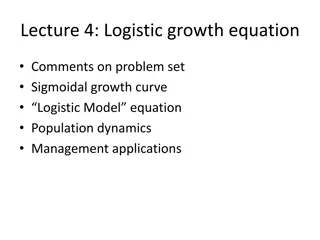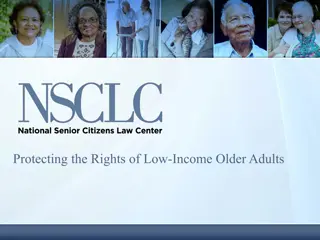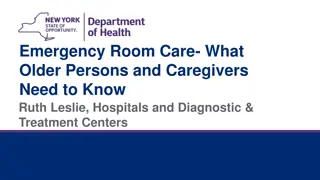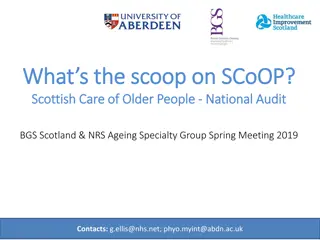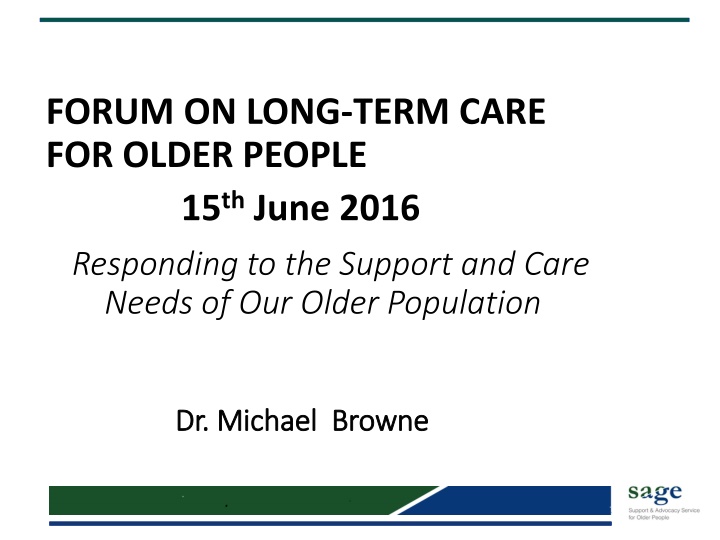
Support and Care Needs of Older Population: Responding to Challenges
Addressing the complexities of long-term care and support for older individuals, this forum on public consultation identifies key considerations in policy, practice, and financing mechanisms. Insights are shared on the continuum of social and medical services necessary for those with chronic health conditions, along with feedback from various respondent categories.
Download Presentation

Please find below an Image/Link to download the presentation.
The content on the website is provided AS IS for your information and personal use only. It may not be sold, licensed, or shared on other websites without obtaining consent from the author. If you encounter any issues during the download, it is possible that the publisher has removed the file from their server.
You are allowed to download the files provided on this website for personal or commercial use, subject to the condition that they are used lawfully. All files are the property of their respective owners.
The content on the website is provided AS IS for your information and personal use only. It may not be sold, licensed, or shared on other websites without obtaining consent from the author.
E N D
Presentation Transcript
FORUM ON LONG-TERM CARE FOR OLDER PEOPLE 15th June 2016 Responding to the Support and Care Needs of Our Older Population Dr. Dr. Michael Browne Michael Browne
Outline of Presentation Outline of Presentation 1. Forum public consultation process 2. 3. Current policy and practice re. long-term care Six core considerations relating to long-term care and support Components of a Framework for Long-term Support and Care 4. 5. 6. Planning for the financing long-term care and support Some key challenges and an Agenda for Action
Long-term Support and Care A continuum of social and medical services designed to support the needs of people living with chronic health problems that affect their ability to perform everyday activities Includes a much broader range of services than acute care Includes social as well as medical and nursing services as well as appropriate housing. No more than 20% of the population of people aged 65 years and over require long-term care.
Public Consultation Process Public Consultation Process Category of respondent Number Individual citizens 17 Professionals 12 NGOs 10 Community groups 7 Family carers 5 Other groups/agencies 3 Total 54
Four Submission Headings Challenges currently experienced Approaches to best provide a continuum of support and care Funding mechanisms Legislative Framework required
Focus of Submissions Focus of Submissions For the most part, the submissions did not address these four questions directly; Points were made in a more general way based on people s experience, understanding of current policy and perceptions of what factors were important; Little reference to either funding mechanisms or the required legislative framework.
A A Wide Range Wide Range of of Responses Responses General Observations on LTC Components of integrated long-term support and care Care in the Community: Deficits Nursing Home Provision: Deficits Personal experiences of difficulties in getting community-based services appropriate to needs Central but underdeveloped role of Housing A need for a new approach to eldercare and a national conversation on the matter
Main Submission Themes The need for a continuum of provision -- - Appropriate housing - The provision of gerontoligally attuned nursing and medical care where required - Therapies, day care facilities and respite services The need for preventative measures including combating loneliness and social isolation and enhancing social connectedness The need to focus on quality of life (both in the community and in nursing homes) as well as on maintaining minimum standards
What the Submissions Said: Indicative Quotes Older people should have more choices, more control and easier access to a comprehensive range of services in their third age ; What I would love to see being developed is a community setting of small homes set around a central community care unit with security, medical, social and restaurant facilities on site ; Long-term care should be pitched somewhere between hospital and hospice with a mixture of residential and independent units ; McAuley Place (Naas) should be used as a an exemplar nationwide ; Every village should have day care with activities ; There is a major shortage of occupational therapists in Ireland employed to work with people with neurological conditions ;
What the Submissions Said: Indicative Quotes As a person fast approaching 60, I would like to have alternatives and choices open to me on how to live a full and engaged life in the years ahead ; There is little point in expecting an older infirm or immobilized person to be able to cope in their own house if their bedroom is upstairs, their kitchen and living room downstairs and their toilet and bathroom a flight of stairs out of reach ; From my visits to nursing homes, they are depressing places the mixing of people with dementia and more active people is completely depressing for the latter ; The Fair Deal scheme is not working it is too legalistic and does not meet the medical and care needs of the person, it does not include pressure relief mattresses or specialised wheelchairs in the cover ;
What the Submissions Said: Indicative Quotes A little over three years ago, the Public Health Nurse applied for 16 hours Home Help for my mother she was granted 30 minutes a week ; Many older people experience a deep fear of institutionalization ; A high percentage of people in nursing homes have multiple chronic conditions, frailty and disability which require gerontological expertise in care, including dementia care and palliative care ; Despite the policy rhetoric, the practice still continues of placing younger people with particular care needs in highly unsuitable settings such as nursing homes for older people, with little hope of that person ever moving on .
Existing Research and Policy Existing Research and Policy A significant body of research in Ireland relating to long-term support and care mainly carried out by the NCAOP during the 1990s and early 2000s Most of these research findings remain valid to-day A plethora of policy reports and strategies relating directly or indirectly to support and long-term care Milestone 1968 Inter-departmental Report, The Care Of the Aged
Existing Research and Policy Existing Research and Policy Research and policy documents have continually stated the primacy of community or home-based care over residential care; Consistently argued that community care should be underpinned by clear legislative entitlement with commensurate dedicated funding; We have the research evidence and the policy statements and related strategies We don t need to re-invent the wheel .
Need for an Honest Debate How we have arrived at the current model of service delivery which in effect prioritises nursing home care over community-based care? No report on long-term support and care has proposed the current model So, How have we got here despite numerous policy statements to the contrary.
Home Care Packages An important development in enhancing the quality of life for people with a high level of dependency living in the community; Those who succeed in getting a Home Care Package are usually satisfied.
Home Care Packages: Deficits Absence of legislative entitlement Only limited access to these packages due to under- funding Entitlement arbitrary in the sense that eligibility is not clear Little or no focus on outcomes The absence to date of formal national quality standards
Contrast to NHSS Other than outcomes, each of these deficits is in marked contrast to the Nursing Home Support Scheme.
The Nursing Home Support Scheme The Nursing Home Support Scheme Legislative basis for NHSS significant Resources are made available Successful in providing access to nursing homes for older people of all financial means
Shortcomings of the NHSS Shortcomings of the NHSS The NTPF negotiated fee with nursing homes providing only for bed and board Some disjoint in relation to the respective roles of the NTPF, the HSE and HIQA relating to quality care provision and related outcomes Little focus on the support and care needs of individuals or on facilitating their will and preferences Failure to take account of the complexity and challenging nature of the care required by people with complex care and support needs, particularly people with dementia
Shortcomings of the NHSS Shortcomings of the NHSS No provision for access to therapies, suitable chairs, aids and appliances Additional charges on residents Spouses of nursing home residents who remain in the family home being worse off financially such instances are regularly referenced in queries to Citizens Information Services
Six Core Considerations Six Core Considerations
Respecting the Rights of Older Respecting the Rights of Older Persons Persons Long-term care and support needs to be developed within a rights-based framework as set out in various rights, legal and ethical frameworks, including, in particular, The European Convention on Human Rights UN Convention on the Rights of Persons with Disabilities The European Social Charter The Council of Europe Statement on the Rights of Older People The provisions of the Assisted Decision-making (Capacity) Act 2015
Respecting the Rights of Older Respecting the Rights of Older Persons Persons Right to self-determination and autonomy Right to dignity, bodily integrity, privacy Right to take risks Right to supports in making decisions Right to protection from all forms of abuse
Respecting the Rights of Older Respecting the Rights of Older Persons Persons Council of Europe Statement on the Rights of Older persons (Principle 43) Older persons in principle should only be placed in residential, institutional or psychiatric care with their free and informed consent. Any exception to this principle must fulfil the requirements of the European Convention on Human Rights, in particular the right to liberty and security (Article 5)
Making Rights Meaningful Are rights are meaningful if they are not enforceable? Legislative provision required Assisted Decision-making Act an essential development Advanced Healthcare Directives Supported Decision-making Other legislative changes required more on this later in the morning
Quality Quality of Life of Life At the heart of long-term care and support Includes Physical health Psychological and emotional well-being Degree of independence Social relationships Relationship to the environment in which people live Social connectedness
Quality Quality of Life of Life Impact of involvement with children, plants and animals The role of the visual arts, music and entertainment in enhancing residential care environments Mobility an important component of a person s independence Balancing the requirements of care and people s need to avoid over-care and learned helplessness people clearly have a right to take risks and to be supported in managing that risk.
Long Long- -term Care :Choice term Care :Choice and Preferences Preferences and People clearly prefer to stay in their own homes and communities until it is impossible for them to do so; Confirmed by the recently published, Meeting Older People's Preference for Care and by the Am rach Public Attitudes Survey; Home care is not seen simply as fulfilling practical needs older people want their home care to also meet their social and emotional needs; LRC 2011 Report referred to companionship needs, home care needs and advanced home care needs
Integrating medical, nursing and Integrating medical, nursing and social care provision social care provision Care and support provided based on the most up to date clinical, nursing and social care practice using a multi-disciplinary approach Need for a gerontologically attuned approach to care Intervention at lowest appropriate level of complexity
Support Support services and therapies services and therapies Important role of occupational therapists, physiotherapists, speech therapists in addition to care attendants, nurses and physicians Clear need for people to have access to social work support Shortfalls in support services and therapies a critical issue
Meeting the specific needs of Meeting the specific needs of people with dementia people with dementia Greater emphasis on prevention Increased public awareness about dementia Increase in early diagnosis Development of a case management model of integrated care Expansion of dedicated community based services Development of new and expanded psychosocial approaches to complement existing medical and neurological models
Meeting the specific needs of Meeting the specific needs of people with dementia people with dementia Intervention at the lowest appropriate level of complexity More supports for family carers of people with dementia Appropriate assisted living housing and dementia- specific residential care facilities. ****Need to fully implement the National Dementia Strategy
Framework for Long-term Care and Support Components of a Framework for Long-term Care and Support Identified
Integrated Needs Assessment Case Management A Framework for Long-term Support and Care Inter-disciplinary Working A Continuum of Provision Assisted living Housing Inter-agency Collaboration Supports for Family Carers
Integrated Needs Assessment Integrated Needs Assessment Objective, independent, comprehensive, consistent, integrated and nationally standardised Level of dependency and/or needs -- health, housing, social care, transport and companionship needs Establishing the will and preferences of individuals Using a multi-disciplinary approach to assess needs and design appropriate responses Clarification of the role of different agencies Establishing in a realistic and transparent manner the respective potential contribution of family members, local communities and NGOs Providing for choice of provider
A Continuum of Provision A Continuum of Provision Services available within the community to enable people to stay as long as possible in their own homes Strong linkages between housing, community support, acute hospital care and long stay residential care Health and social care services accessed at the level required in a timely and appropriate manner
Inter Inter- -agency Collaboration agency Collaboration People with multi-faceted long-term care needs obviously require an integrated package of supports - within and between statutory agencies - HSE, DSP and LAs - between statutory agencies, NGOs and the private sector Clear link between people s housing situation, their quality of life and their ability to continue to live in the community
Inter Inter- -agency Collaboration agency Collaboration Strong policy aspirations and some innovations and good practice already in existence Good practice tends to be ad hoc and reliant on individual personalities rather than on a systematic operational framework Affected by a number of factors, including budgetary issues, statutory functional responsibilities and separate funding streams The majority of public expenditure decisions continue to be made at central level
Supports for Family Carers Supports for Family Carers The role of the family in providing long-term care is critical A 2014 NCPOP study found that in general, carers reported that they found caregiving to be a positive experience. BUT More than 2 in every five carers (44%) were at risk of developing clinical depression; Approximately a third of carers reported that they experienced moderate or severe burden; More than half of carers (56%) experienced some form of mistreatment by the care recipient in the previous three months The National Carers Strategy clearly requires full implementation.
Maximising the Role of Housing in Maximising the Role of Housing in Long Long- -term Care term Care Appropriate well-designed housing and related preventative services are centrally important in promoting the health and well- being of older people Local authorities have a critical role to play and are well placed to engage with, understand and plan for the local housing needs of the older population Role of NGOs in optimising people s ability to remain in their own homes and in developing models of assisted living
An Inter An Inter- -disciplinary Approach disciplinary Approach Current delivery systems and protocols may be inadequate to deal with the complexity of people s long-term care needs. Primary care team identified by the HSE as consisting of GPs, nurses, home helps, physiotherapists and occupational therapists --not clear to what extent this model is being implemented and how it is working in practice in respect of LTC Not clear where social work. speech and language therapy, dieticians, chiropodists, psychologists fit into this model Crucial role of geriatricians in multi-disciplinary approach
Case Management Case Management Obvious need for a designated Case Manager to oversee and manage the Integrated Care and Support plan and to source services as required
Financing Long Financing Long- -term Care term Care Financing system for long-term care required which achieves similar levels of service supply in both the community and in residential care facilities Current distinction between the funding of acute medical services and the funding of long-term care and personal social services
The Mercer 2002 Report Social Insurance would provide a stable and lasting framework for long-term care provision and would also raise public awareness of long-term care issues. Social Insurance would eliminate means-testing for those whose contributions qualify them for benefits; The public may be more willing to pay additional social insurance contributions than higher taxes to fund long-term care; Social insurance financing would provide a reasonable fit in the Irish context; The strong entitlement to benefit that social insurance financing would confer would be likely to engender good public support;
Agenda for Action Agenda for Action We know what people want! We know what the current policies are! We know what current practice is! We know where the gaps are! We need to take action now to avoid the dismal scenario
Multi Multi- -level Responses level Responses Society Government Progressing the LTC Agenda Inter- departmental An Inter- disciplinary approach Local government and administration Community HSE
At societal level At societal level Developing a strong social awareness about the impact of the ageing process Making the choice to provide the required resources financial, infrastructural and personnel in key disciplines to respond creatively and imaginatively to the long-term care and support needs Engage in an open and honest discussion about the respective responsibilities of the State, families and local communities in providing long-term care for those who require it Engage in an open and honest discussion about the respective responsibilities of the State, families and local communities in providing long-term care for those who require it
At Government level At Government level Examine how the financing of long-term can be incorporated into the social insurance system Fully implement the Local Government Reform Programme with devolved functional responsibilities Provide a legislative framework for community care services Fundamentally reviewing the NHSS model and the role of the NTPF therein
At Inter At Inter- -departmental Level departmental Level The Departments of Health, Environment and Social Protection working collaboratively to develop and implement integrated housing and support models and to provide joint funding streams accordingly Exploring ways of delegating functional responsibility and related funding for integrated housing and care supports to local government and local administrative structures
At HSE Level At HSE Level Developing realistic alternatives for the provision of support and care to people who do not wish to spend the last years or months of life in a nursing home Collaborating with assisted living initiatives in the provision of enhanced support and care Developing a fully transparent national set of eligibility criteria for Home Care Packages Formalising and developing a regulatory framework for home care


